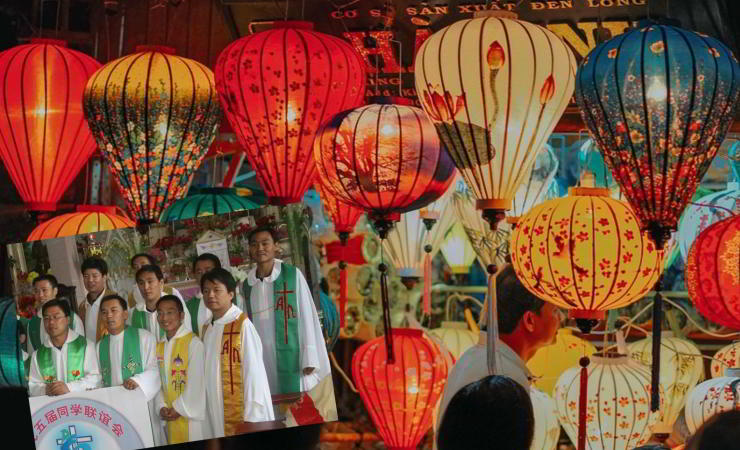The arrival of the Comboni Missionaries in Macao soon led to a question: What about mainland China? Thus, was born a project to support the Church in China: Fen Xiang. The aim is to promote the sharing of resources and means with the dioceses through the formation of clergy, religious and laity.
The opening of a community in Macau and, later, another in Taiwan, were the foundations that allowed the Comboni presence to be launched in the Chinese context. However, we were still looking at mainland China, where we wanted to be present.
Although the task was complex, by the end of 1998 a plan had been drawn up to make this dream come true. It was called the Fen Xiang project, which underlined the vision of sharing and mutual help between churches, of which the Comboni Missionaries wanted to become instruments and animators.
It aimed to promote a type of presence that was not fully developed at that time but would allow the Comboni Missionaries to be in contact and, in some way, share the concerns of the Church in China. It also fostered a social dimension, which included the promotion of integral human development through involvement in projects to support poor children, orphanages with physically disabled children, AIDS patients, and homes for the elderly.
From the outset, having a presence on the Chinese mainland was a strategy that, in its form and application, slowly developed into what we call the “itinerant Comboni mission.” The Comboni itinerancy in China began in October 1998, with trips, contacts and interactions with Church leaders in China.
In its twenty-seven years of existence, the Fen Xiang project has opened up new fronts and places in its insertion and collaboration with the Church in China. Its objectives have centred on spreading the missionary spirit of the Church, an unquestioning commitment to the poorest in society, and an itinerant mission that takes the form of trips from Macau to mainland China.
Fen Xiang’s general objective is to grow and strengthen the local Church so that the local Church can grow and carry out specific initiatives and projects. There is good collaboration with the Church in China in the field of formation through scholarships for priests, seminary professors, and religious who are preparing themselves in the religious, theological, and pastoral fields, as well as in the social sciences or health, by specializing in areas that enable them to better serve society.
The Fen Xiang team, which periodically visits China, gives formation courses and spiritual exercises and shares the concerns of religious and missionary life with seminarians, religious, priests and lay people, mainly in the north of China, in the provinces of Gansu, Hebei, Henan, Shanxi, Shaanxi, Henan, Sichuan and Shenyang; it also animates the local Church and makes St. Daniel Comboni and the Comboni missionary spirit known; in this way, he serves as a bridge between Churches; Fen Xiang is also involved in human promotion projects to express the social dimension of faith, something that is inseparable from the missionary vocation to the poorest.
What was clear from the start, and remains so today, is that God inspired the Fen Xiang project and was in tune with the basic characteristics of the Comboni charism: concern for the marginalized in society (setting up orphanages, aid centres, scholarships for poor students from the countryside); the need to share the missionary spirit with the local Church (through courses, newsletters, personal contacts and contributions through retreats); the religious formation of the local Church (annual retreats for priests, sisters, seminarians and lay people, training courses for Church personnel, summer and winter camps for young people), to reaffirm that the Chinese are the missionaries of their people.
In these years of Fen Xiang’s journey, we can say that the results have been very satisfactory. Priests, seminary teachers, and religious people have trained in different places through Fen Xiang’s help, and back home, they have taken up positions of responsibility to continue helping in their respective areas in Christian formation.
Fen Xiang’s tangible and obvious challenges are not without difficulties when they take place in the context of insecurity. Visits to China depend on many circumstances, including obtaining a visa.
This makes this project typically missionary and Comboni. It has been and continues to be a hidden work, where prudence prevails, and all the leading roles must be left in the hands of the local Church. For this reason, we continue to invest in the integral formation of its pastoral agents, including the human, spiritual, intellectual and pastoral formation of the laity. They take responsibility for charitable activities, catechesis, and the missionary impulse.
The fruits will come as and when God wills. Still, there is no doubt that the witness of the Church in China and its pastoral workers, who have suffered persecution and continue to suffer government control, helps us to put into practice what we maintain: that we make common cause with the people to whom we are sent, that we learn from people, and that we live together with the local Church with whom we share our lives. (Elzoiz) – (Photo: China: Priests attending a course. File swm – Pixabay)









